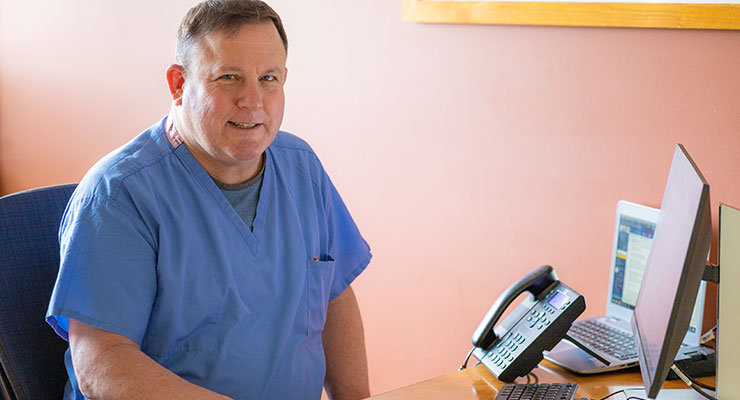Dr. O’Hair: “A new heart valve appears to have a superior design and avoids open-heart surgery.”
- Category: General, Cardiology, Surgery
- Posted On:
- Written By: Boulder Community Health

Advances in heart valve design, performance and durability are critical to the more than five million Americans diagnosed with heart valve disease each year. Those with mild heart valve disease often live long, full lives without the need for intervention. In more severe cases that may compromise heart function, a valve replacement may be necessary.
During a free online Boulder Community Health (BCH) health lecture, cardiothoracic surgeon Daniel P. O’Hair, MD, described results of his groundbreaking study on the longevity of heart valves, recently published in the Journal of the American Medical Association (JAMA).
He found that a specific type of heart valve that is implanted using Transcatheter Aortic Valve Replacement (TAVR) had a slower rate of deterioration when compared to traditional valves implanted with open heart surgery.
Dr. O’Hair is the Director of Cardiovascular Surgery at Boulder Heart and one of the nation’s leading experts in heart valve surgery. He has performed thousands of heart valve procedures, including complex multiple valve surgery, robotic-assisted mitral valve repair, and is Colorado’s most experienced TAVR surgeon. Since 2010, he has performed more than 2,000 TAVR procedures and has extensively published on the topic.
Dr. O’Hair noted his goal is to help patients answer questions such as the following: “What are the important characteristics of various heart valve replacement devices?" "How long do they last?" "How long will the replacement last?" "Will I need it replaced again someday?"
_________________________________________________________________
Video: Watch "Advanced Treatments for Aortic Valve Disease"
__________________________________________________________________
Design of Replacement Valves
Dr. O’Hair presented various heart valve designs that have been used over the last 70 years. He explained, “Some of the more contemporary valve designs are made from a metal alloy frame with leaflets made from a pig or cow.” Leaflets are the flaps that open and close, acting as one-way inlets for blood coming into or out of a ventricle.
Many of the contemporary aortic valves that are still commonly used require open-heart surgery. This involves a chest incision, and the chest bone will need to heal post-surgery.
He explained that, today, many patients are eligible to have their valve replaced using a transcatheter technique (TVAR), where the valve is delivered over a wire from the femoral artery, completely avoiding the need for a chest incision. The question of how these new valves compare to the traditional surgical implants is critical to patients seeking the best long-term result.
The Most Common Valve Implants Today
Dr. O’Hair presented 30 different valves and stated, “Our goal is working with our patients to choose the best valve such that it will be the only replacement valve they’ll need in their lifetime. Data driven decisions help us deliver that superior result.”
He noted, “The two he most often implanted and extensively studied transcatheter valves in the world today are the Sapien and Evolut valves.”
Sapien Balloon Expanded Transcatheter Heart Valve
“The Sapien transcatheter valve was based on a very successful surgical implant,” said Dr. O’Hair. “It has a rigid frame that is expanded by a balloon." He added, however, “The degeneration of the Sapien valve, after five years, was significantly higher than the surgically implanted valve in a large randomized trial.”
Evolut Self-Expanding Supra-Annular Bioprosthesis
The Evolut is self-expanding and was designed specifically to be delivered over a wire from the leg's femoral artery. Its unique nitinol frame valve collapses during delivery and self-expands when placed in the heart. According to Dr. O'Hair, data suggests that the uniquely tall leaflets of Evolut are subject to less stress than those of the Sapien valve.
Dr. O’Hair shared, “We now have evidence that TAVR with a specific heart valve known as Evolut, not only avoids the need for a chest incision, but results in a slower rate of deterioration than surgically implanted valves based on randomized clinical trials. This advantage was associated with a lower risk of mortality and hospital readmission.”
Predicators of Valve Deterioration
Dr. O’Hair noted the aortic valve implants are subject to wear. The risk of valve deterioration is more likely to occur:
- in women perhaps due to smaller anatomic size
- in younger patients
“In an effort to give our patients the best lifetime result, we make data-driven decisions and choose the valve that has the highest performance and greatest durability. ” Dr. O’Hair stated.
Schedule an Appointment
To schedule an appointment with Dr. O'Hair, call 303-442-2395 or visit Boulder Heart.
Click here to view/download a PDF of slides shown during the lecture.
Want to receive notification of special events and lectures?